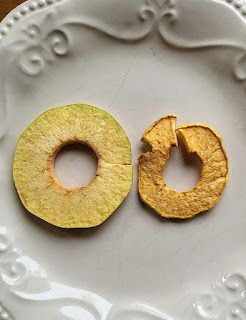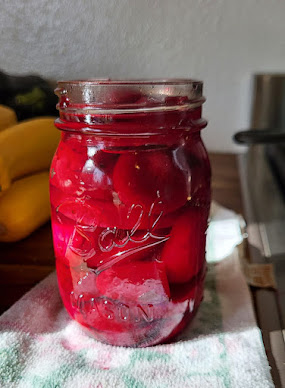 |
| The last harvest of the season. |
"Let us not become weary in doing good, for at the proper time we will reap a harvest if we do not give up. Therefore, as we have opportunity, let us do good to all people, especially to those who belong to the family of believers."
______________
It's been a crazy-busy fall! Some of this is due to the usual homestead push to finish harvesting and preserving what I grew this year, but I also had an extra-curricular activity this summer and fall: I was rehearsing for, and then performing, the role of Mary Poppins in a local theater production. (Yes, I do have a life outside of homesteading!) Once upon a time, I was a professional musical theater performer; now I just do a show now and then for fun. This was a particularly challenging musical, and it ended with me getting the "C" virus for the first time, but gosh it was fun! Even more delightful was that I got to perform with my daughter, who'd never been in a musical before. Special times!
On the homestead front, the garden produced quite abundantly this year, so I spent a lot of time preserving this fall. The only disappointment was my winter squash. I'd planted most of it in newly purchased soil, and, as it turned out, it was still pretty "hot" (decomposing). This lead to extremely slow initial growth. I should have just fertilized the winter squash as soon as I noticed the slow growth rate and yellow leaves (signs of a nitrogen deficiency), but I don't typically fertilize anything, and I just kept putting it off. The end result was that I got few fully mature winter squash. But hey, some winter squash (which I love because it requires zero preserving in order to last many months in storage) is better than none! We eat the less mature squash just like summer squash, too - so nothing really goes to waste.
The garden is now ready for winter: All the tender crops are harvested, and I left most of the summer plants in the soil. This helps prevent erosion during winter, and as the plants die, all the nutrients built up in the roots release into the soil. I've also covered the top of the soil with rabbit manure. (Don't have manure? Add whatever organic matter you have on hand, like dried
leaves, dried grass clippings, leaves from healthy plants, roots from
previous crops, compost,
wood chips...laid on top of the soil, not dug or tilled in, if you're following the abundant and easy no till, no dig method I use.)
 |
| Playing Mary Poppins. |
Overwintering in the garden are Brussels sprouts, carrots, cabbage, kale, and collards. I do nothing special to these winter crops; they quite easily survive the small amount of snow we might get. There are also still snow peas growing and producing. (Want to learn more about growing food in winter? Click here.)
 | ||
| Brussels sprouts overwintering in my garden. | |
 |
| An abundance of summer squash led to lots of zucchini bread, fried squash, and zoodles. |
 |
| Nutrient-rich organic soil grows the biggest and best veggies! |
The orchard didn't do a ton this year. There were no plums or ripe figs (due to spring weather conditions) and the pears were diseased, but we had plenty of apples. In fact, it was the perfect harvest for a busy season, since we had plenty, but not so many I was overwhelmed!
 |
| I can, freeze, dehydrate, and freeze dry many foods, including apples. Freeze dried is on the left; dehydrated is on the right. |
 |
| Zucchini bread jam from The All New Ball Book of Canning and Preserving. |
 |
| Canning pickled beets. |
 |
| My Walla Walla onions were HUGE this year! Just 2 of them, chopped, weighed 5.5 lbs and filled my freeze dryer. |
On the livestock front, we replaced our aging hens with chicks we hatched. Now pullets, it's interesting to see them grow, since they are a "barnyard mix" - something we've never raised before. We'll see how they stack up to our usual favorite breed: Australorps. We are taking a break from quail currently, but continue to raise rabbits, who are doing quite well, indeed.
 |
| Our new hens aren't laying yet, so I'm thankful I have home freeze dried eggs in the pantry! |
RELATED POSTS:
Kristina's "Famous" Zucchini Bread recipe
Freeze Dried vs. Dehydrated. What's the Difference?













No comments